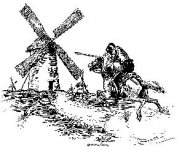What about seasoning?
Is it possible also that, however much instruction you take in over the course of a year should this also be tempered and tested by competition and exposure to better players? Or, do you think it's possible to isolate yourself in a garage or game-room for a year with practice, drills and lessons and simply come out of this box and into a big tournament environment?
- Some very good suggestions, so far.
- Mr. Barioni - I'll contact you at your website.
- This is possibly for me, but more a social experiment that will be completely documented.
- Jewitt, Eberle, Eckart, Dominguez, Harper, Hemmah, Seymour - All excellent suggestions!
This is not just to fulfill some narcissistic dream of becoming a pro player, but rather to tell a positive story about pool. I've seen others try to do it before too, like the gentleman from the 'Angles of Reflection' website (the name escapes me), John Nekali, who worked alot with Larry Bohn and Jaden Brock, who used the Mezz Tour to improve his game. Ii would like to tell the story of someone who can defy the odds and reach to the top. If that person is me, then so be it but this still remains to be decided on. I honestly feel like I'm too busy to really put the work in, because I'm also a pool promoter - yet at the same time I do have the unique access to these players/instructors and love the game so much that I would definitely be willing, if I could bankroll it.
So, for a little while at least - this question still prevails: Do you think it's even possible - to turn this 'player' into a pro in one year's worth of concentrated instruction?
I've seen it happen. Guys go from pretty good players to pro players all the time. Sometimes in a short time frame. Sometimes it takes them a while.
Sure fundamentals are important. And you have to learn the ins and outs of the games and how to win at every level.
The biggest challenge though, is that you (everybody) ALREADY play at the level you want to.
If you wanted to play better. You would.
Some guys start out seeing themselves at a high level. They advance quickly and we say they have natural talent. Some guys see themselves as a good bar player and no matter how much they play and practice, and no matter what instructors they take lessons from, that's how they shoot for 40 years.
When you're playing Oscar or Vilmos, do you see yourself as the underdog who can get a couple of rolls and make it close? Do you see yourself as competitor of theirs? Do you see yourself as someone who belongs on the table with them? Do you see yourself as the favorite?
Until you change how you see your game in relation to others, your game doesn't change in relation to others. No matter how good you're making balls.
It's a bit of a chicken and egg problem because it's really, really hard to believe that you can beat someone that personal history says you can't beat. That's why people practice. At some point practice becomes less about actually getting better and more about believing that you are getting better.
What shots on the pool table have you made? All of them.
What safes do you know? All of them.
What types of english do you know how to use? All of them.
What position strategies do you know? All of them.
What patterns do you know to run out? All of them.
What speeds have you hit the cueball at? All of them.
At the level you're at you already have all the ability, knowledge, touch, and strategy to compete at that level. You've already made every shot, got every position and run out every table. You've strung multiple racks. You've made tons of shots under pressure. You've gambled and won. Gambled and lost.
The task from here is applying specific knowledge to specific gaps in your game as they pop up, and convincing yourself that you deserve it. You can do it. You belong with the big dogs.
It's more of a transformation of your heart than your pool game.
